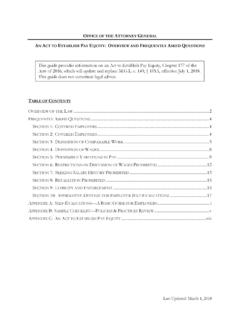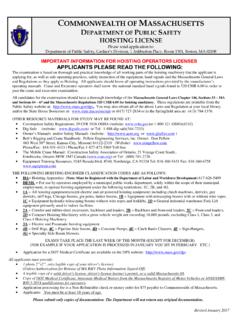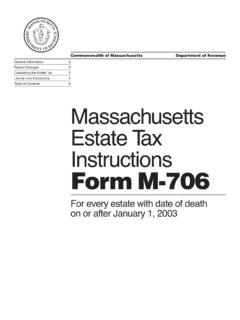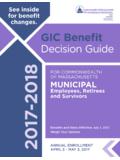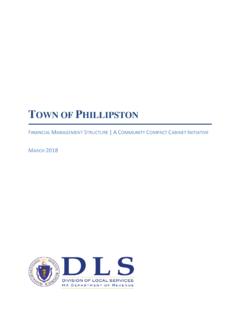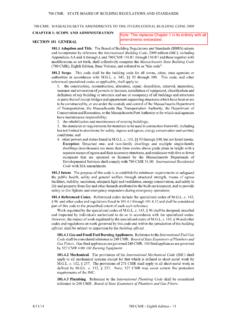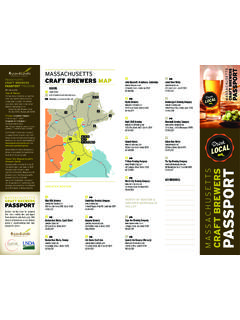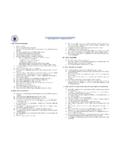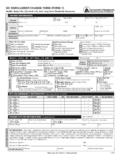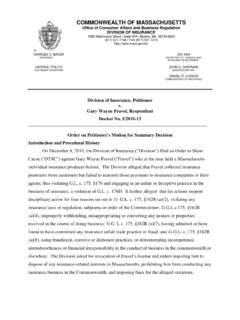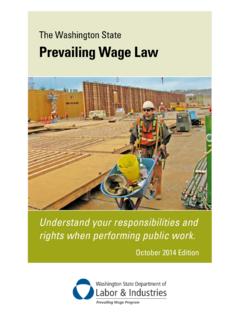Transcription of NOTICE: All slip opinions and orders are subject to formal ...
1 NOTICE: All slip opinions and orders are subject to formal revision and are superseded by the advance sheets and bound volumes of the Official Reports. If you find a typographical error or other formal error, please notify the Reporter of Decisions, Supreme Judicial Court, John Adams Courthouse, 1. Pemberton Square, Suite 2500, Boston, MA, 02108-1750; (617) 557- 1030; SJC-12602. BELKY FERMAN & another1 vs. STURGIS CLEANERS, INC., & Suffolk. December 4, 2018. - February 19, 2019. Present: Gants, , Lenk, Gaziano, Lowy, Budd, Cypher, &. Kafker, JJ. Massachusetts Wage Act. Practice, Civil, Attorney's fees. Civil action commenced in the Superior Court Department on November 19, 2014. Following a stipulation of dismissal, an application for attorney's fees and costs was heard by Karen F. Green, J. The Supreme Judicial Court granted an application for direct appellate review. John J.
2 McGlone, III (David T. Norton also present) for the defendants. Elizabeth Soltan (Patricio S. Rossi also present) for the plaintiffs. Joseph Michalakes & Liliana Ibara, for Immigrant Worker Center Collaborative & others, amici curiae, submitted a brief. Margaret E. Monsell & Ruth A. Bourquin, for Massachusetts Law Reform Institute & another, amici curiae, submitted a brief. 1 Veronica Guillen. 2 Peter Triantos. 2. KAFKER, J. This case requires us to consider whether employees, whose claim against their employer under the Wage Act, G. L. c. 149, 148, 150, resulted in a favorable settlement agreement and stipulation of dismissal, "prevailed". in their suit for purposes of an award of attorney's fees and costs under the Wage Act's fee-shifting The defendants contend that the trial judge should have applied the test for determining prevailing party status under Federal fee- shifting statutes established by Buckhannon Bd.
3 & Care Home, Inc. v. West Virginia Dep't of Health & Human Resources, 532. 598 (2001) (Buckhannon). Because Buckhannon requires a prevailing litigant to obtain judicial approval or "imprimatur". of a private settlement, the defendants argue that the plaintiffs did not prevail. Id. at 605. The plaintiffs disagree, arguing that, because we have previously decided that the Buckhannon test has no applicability to Massachusetts fee- shifting statutes, the correct standard to determine prevailing party status under the Wage Act is the "catalyst test." Under the catalyst test, if the plaintiff's lawsuit is a necessary and important factor in causing the defendant to grant a material 3 The employees brought claims under both G. L. c. 149 and G. L. c. 151, which governs payment of overtime wages. Because our analysis is the same for both fee-shifting provisions, which are identically worded, for simplicity's sake we refer to the claims as brought under the Wage Act, unless otherwise noted.
4 3. portion of the requested relief, a settlement agreement, even without any judicial involvement, may qualify the plaintiff as a prevailing party for fee-shifting purposes. None of the parties disputes that the plaintiffs met the catalyst test; rather, the central issue is the threshold question of the proper test to apply to determine prevailing party status under the Wage Act. We hold that the catalyst test applies to Wage Act claims and that the trial judge correctly found that the plaintiffs satisfied that test in the instant case, and we therefore affirm the award of attorney's fees to the plaintiffs under the fee- shifting provisions of the Wage 1. Facts and procedural history. The facts and procedural posture of this case are not contested. The plaintiffs are former employees of the defendants' dry cleaning business who brought suit in November 2014, claiming that the defendants failed to pay them approximately $28,000 in regular and overtime wages as required by G.
5 L. c. 149, 148 and 150, and G. L. c. 151, 1A and 1B. Both of these chapters confer a private 4 We acknowledge the amicus briefs submitted in support of the plaintiffs by the Immigrant Worker Center Collaborative, the Mental Health Legal Advisors Committee, Community Legal Aid, Inc., the Center for Law and Education, the Disability Law Center, the National Consumer Law Center, Heisler Feldman &. McCormick, , and the Suffolk University Law School Accelerator-to-Practice Program; and by the Massachusetts Law Reform Institute and the American Civil Liberties Union of Massachusetts. 4. right of action on an employee "aggrieved" by an employer's violation of their They further provide that "[a]n employee so aggrieved who prevails in such an action shall be awarded treble damages .. and shall also be awarded the costs of the litigation and reasonable attorneys' fees." See G. L.
6 C. 149, 150; G. L. c. 151, 1B. In their complaint, the plaintiffs claimed treble damages, as well as costs and attorney's Following an almost two-year period in which there was the entry and lifting of a default judgment against the defendants, discovery, and the filing of various pretrial motions, the case was scheduled for trial in November 2016. Several weeks before 5 General Laws c. 149, 150, permits "[a]n employee claiming to be aggrieved by a violation" of its provisions to "institute and prosecute in his own name and on his own behalf, or for himself and for others similarly situated, a civil action for injunctive relief, for any damages incurred, and for any lost wages and other benefits." General Laws c. 151, 1B, allows an employee claiming an overtime pay violation to "institute and prosecute in his own name and on his own behalf, or for himself and for others similarly situated, a civil action for injunctive relief, for any damages incurred, and for the full amount of the overtime rate of compensation less any amount actually paid to him by the employer.
7 " As provided by G. L. c. 149, 150, the plaintiffs first filed a written complaint with the Attorney General and requested and received written assent to bring a civil suit within ninety days of filing that complaint. 6 The plaintiffs also asserted breach of contract claims and violations of the Federal Fair Labor Standards Act, 29 207 and 216(b), but did not claim additional damages with respect to these claims. The plaintiffs conceded that they had not achieved prevailing party status on these claims. 5. the trial date, the court referred the parties to mediation. As a result of mediation, the parties executed a memorandum of understanding in which they agreed to settle the case for $20,500, but reserved the issue of the plaintiffs' entitlement to attorney's fees for resolution by the court. The parties then executed a mutual release and settlement agreement that provided that it "is the result of a compromise and that nothing set forth herein constitutes an admission of wrongdoing or liability.
8 " Subsequently, the parties filed a stipulation with dismissal in court, agreeing that "[p]ursuant to the Memorandum of Understanding and .. Mutual Release and Settlement Agreement .. Plaintiffs may file a Motion for Costs and Attorneys' Fees," following determination of which the matter would be "dismissed with prejudice" and "all rights of appeal .. waived."7. 7 The plaintiffs argue that the defendants have waived the right to appeal the issue of attorney's fees because the mutual release and settlement agreement says that the parties "agree to abide by the decision of the Court with regard to [the attorney's fees] petition." Given the result we reach today in favor of the plaintiffs, we need not resolve the issue whether the defendants waived their right to appeal altogether. We also note that we took the case on direct appellate review, and sought amicus briefing, to resolve the important, unresolved issue of the appropriate standard to apply for attorney's fees petitions under the Wage Act.
9 Cf. New Bedford Hous. Auth. v. Olan, 435 Mass. 364, 372 (2001) (despite waiver of issue, "[b]ecause there is some uncertainty over the question, because it involves a matter of public interest that is likely to arise in the future, and where the issue has been fully briefed, we will address the issue"). 6. In their motion for attorney's fees, filed in February 2017, the plaintiffs claimed approximately $40,000 in attorney's fees and $1,000 in costs. The defendants opposed the motion. The judge concluded that the catalyst test and not the Buckhannon test applied to Massachusetts fee-shifting statutes. Applying the catalyst test, the judge found that the parties'. agreement, which amounted to approximately seventy percent of the plaintiffs' initially demanded monetary relief, resulted "in a practical benefit as a result of their attorneys' efforts.". This made the plaintiffs " prevailing parties" for purposes of an award of attorney's fees and costs.
10 The judge granted the plaintiffs' motion with respect to $16,153 in attorney's fees and the entire amount of This appeal followed. 2. Analysis. Whether a plaintiff is a " prevailing party". for purposes of a statutorily authorized award of attorney's fees "is an issue of law that we consider de novo." LaChance v. Commissioner of Correction, 475 Mass. 757, 764 (2016), quoting Newell v. Department of Mental Retardation, 446 Mass. 286, 298, cert. denied, 549 823 (2006). To determine whether the plaintiffs here were prevailing parties, the defendants argue that the trial judge should not have defaulted to the catalyst 8 The judge deducted claimed attorney's fees as to certain precomplaint work and motions, as well as to work relating to the claim under 29 207, as to which she found that the plaintiffs did not prevail. 7. test, but rather should have considered whether, as required by Buckhannon, there was a "material alteration of the legal relationship of the parties" (citation omitted) and a "judicial imprimatur on the change.
